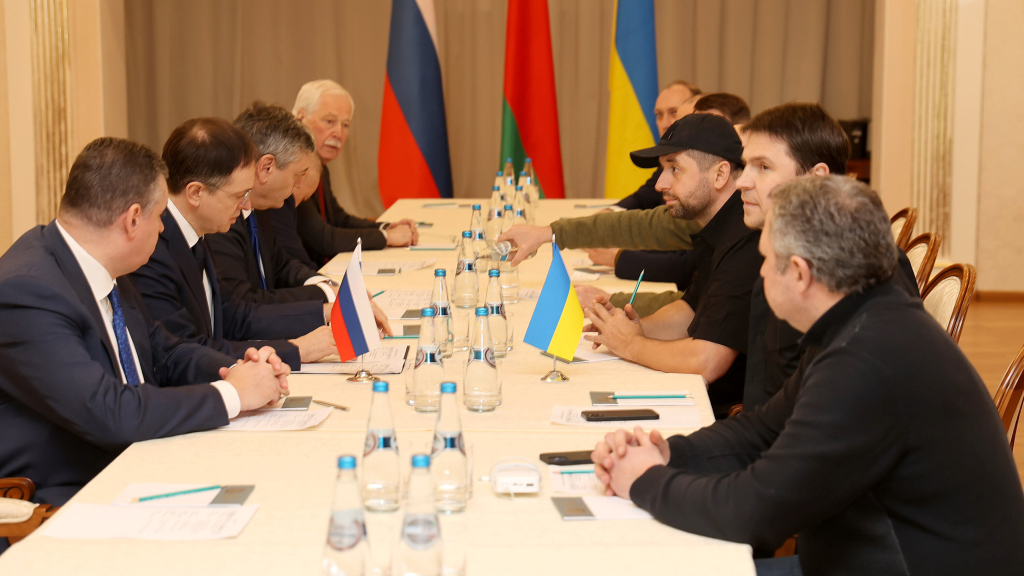Crimea negotiations are at the forefront of discussions aimed at resolving the ongoing Russia-Ukraine conflict, highlighting the peninsula’s critical importance in the geopolitical landscape. This strategically located territory has been a point of contention for centuries, with its rich history intertwined with Russian, Ukrainian, and Crimean Tatar narratives. The significance of Crimea extends beyond its military value; it is a region deeply embedded in spiritual customs and cultural heritage, making it vital not just for the nations involved, but for global stability. As diplomacy fluctuates, the negotiations surrounding Crimea continue to reveal deep-seated disagreements rooted in history, identity, and national pride. Understanding the complexities of the Crimea negotiations is essential to grasping the broader implications for regional security and international relations.
Discussions concerning the status of Crimea represent an urgent pivot in the broader Russia-Ukraine hostilities, reflecting the peninsula’s pivotal role in this enduring territorial dispute. Often referred to as a strategic gateway between Europe and the Black Sea, Crimea has witnessed a complex history fraught with territorial claims and cultural significance. The ongoing talks encapsulate not only military considerations but also the preservation of cultural identities, including the heritage of the Crimean Tatars, who have faced historical injustices in the region. With both nations asserting their claims over this prized land, the negotiations serve as a litmus test for future peace endeavors. Acknowledging the multifaceted context of Crimea can illuminate the underlying tensions that shape these crucial diplomatic efforts.
The Historical Significance of Crimea in the Russia-Ukraine Conflict
Crimea’s importance in the Russia-Ukraine conflict cannot be overstated. Historically, the peninsula has been a contested territory, with its roots tracing back through Greek, Mongol, and Ottoman occupations. Each of these cultures has left a mark on Crimea’s identity, adding layers of complexity to its historical narrative. The strategic significance became glaringly apparent when Russia annexed Crimea in 2014, asserting claims over a region rich in cultural heritage and military value. This annexation was not merely a matter of territorial gain; it represented a profound geopolitical shift, influencing relations between Russia and the West and igniting worldwide debates over sovereignty and territorial integrity.
In the context of the ongoing negotiations, understanding Crimea’s history is vital to grasping why it remains a flashpoint in international relations. The peninsula, integral to the identities of both Russia and Ukraine, carries significant emotional weight. For Ukrainians, Crimea symbolizes resilience against aggression, while for Russians, it evokes historical claims to land that has become emblematic of national pride. Thus, any future negotiations surrounding Crimea will need to delicately navigate these historical narratives to build a sustainable peace framework.
Crimea’s Military Importance in Modern Geopolitics
The military value of Crimea has heightened its profile in the current geopolitical landscape. Dubbed by Russian President Vladimir Putin as their ‘unsinkable aircraft carrier,’ Crimea serves as a strategic military asset that dominates the Black Sea region. The location allows for the deployment of advanced military capabilities, including fighter jets and naval forces, directly threatening Ukraine’s security. Russia’s consolidation of its Black Sea Fleet in Sevastopol enables it to project power across neighboring regions, which raises alarms for NATO allies like Romania and Turkey. This military posture has profound implications for regional stability.
Ukraine’s responses to these military provocations highlight the critical stakes involved in the conflict. By employing high-tech missiles and UAVs, Ukraine has demonstrated its capability to counter Russian naval threats effectively. The attacks on key infrastructure, such as the Kerch Bridge, underscore Ukraine’s commitment to challenging Russian dominance in the region. Understanding the military dynamics in Crimea is essential for comprehending the broader implications for international security, as the area remains a focal point for both defensive and aggressive military strategies.
Crimea Negotiations: The Path to Peace or Prolonged Conflict?
The ongoing Crimea negotiations illustrate the complexities of achieving peace in the Russia-Ukraine conflict. Washington’s role as a mediator underscores the international stakes involved, with various factions advocating differing approaches to resolve the territorial dispute. The difficulties arise from entrenched positions held by both Ukraine and Russia. Ukrainian President Volodymyr Zelenskyy’s refusal to accept Russian control over Crimea signals a deep-seated resolve among Ukrainians, while Russian narratives continue to frame their claims as historic and rightful. As these negotiations unfold, understanding each side’s motivations and principles will be critical to any peace process.
Despite the various diplomatic efforts, substantial disagreements remain in the negotiations, often pushing the parties further away from a resolution. Russian insistence on their claims clashes with international opinions that regard the annexation as illegal. The discord reflects a broader struggle that resonates not just in the region, but across global power dynamics. Therefore, successful negotiations will require not only addressing the immediate territorial challenges of Crimea but also reconciling historical grievances and mutual security concerns to foster long-term stability.
The Impact of Crimea on Regional and Global Security
Crimea’s strategic position significantly impacts both regional and global security frameworks. As a land corridor connecting Eastern Europe to Asia, its status influences many geopolitical interactions that go beyond the immediate conflict between Russia and Ukraine. The military build-up in Crimea serves as a deterrent to Western alliances, encouraging a re-evaluation of defense strategies in Europe. NATO’s responses emphasize the importance of collective security, as member states must balance their commitments to one another with the rising threat posed by Russian military capabilities.
Moreover, the situation in Crimea has global ramifications, especially concerning international law and norms regarding territorial integrity. The annexation and ongoing conflict pose questions about the effectiveness of institutions designed to uphold order and peace. Nations observing the conflict are likely to draw lessons regarding sovereignty, intervention, and the complexities of power dynamics in post-Cold War Europe. Crimea’s fate is, thus, not only vital for Ukraine but represents a critical test of the international community’s resolve in defending established norms against aggression.
The Cultural Heritage of Crimea and Its Peoples
Crimea’s rich tapestry of cultural heritage plays a pivotal role in understanding the ongoing conflict. The presence of the Crimean Tatars, a nation with deep historical roots in the region, adds a layer of complexity often overlooked in mainstream narratives. Their tragic history of persecution, particularly during the Soviet era, highlights the cultural and historical significance of Crimea. Acknowledging the Tatars’ contributions to Crimea’s identity and the ongoing struggles for their rights is crucial, as it connects to broader themes of self-determination and cultural preservation.
The cultural aspect extends beyond the Tatars, encapsulating a diverse array of influences that have shaped Crimea over the centuries. As a crossroads of various civilizations, the region is a melting pot of languages, religions, and historical narratives. This diversity is both a source of conflict and an opportunity for reconciliation. Efforts to preserve and celebrate this cultural heritage could form a basis for dialogue among different communities within Crimea, potentially aiding peace processes by emphasizing common interests and shared histories.
Exploring Crimea’s Economic Value in the Russia-Ukraine Conflict
The economic implications of Crimea are intricately tied to the Russia-Ukraine conflict, influencing both parties’ strategies. Crimea’s access to the Black Sea is crucial for trade routes and resource distribution, establishing it as a vital economic asset for any controlling power. The Russian military presence has transformed the region’s economic landscape, integrating it more closely into the Russian economy while severing its ties with Ukraine. This economic integration has raised significant concerns for Ukraine, which views Crimea as a crucial part of its economic framework.
In contrast, discussions around Crimea’s economic value during negotiations reveal the challenging dynamics at play. While Russia seeks to secure economic benefits from its annexation, Ukraine aims to preserve access to vital resources and trade routes. The discussions often center around energy security and resource control, further complicating diplomatic efforts to establish a lasting peace. Thus, the economic stakes in Crimea cut to the heart of the conflict, affecting both immediate negotiations and long-term resolutions.
The Role of International Law in Crimea’s Ongoing Dispute
International law plays a fundamental role in shaping the discourse around Crimea’s status. The annexation of Crimea by Russia has sparked widespread condemnation, with many countries and international bodies labeling it an illegal occupation. This viewpoint stems from principles outlined in the United Nations Charter, which prioritizes the sovereignty of nations and non-interference in territorial matters. As negotiations unfold, international law serves as both a reference point and a battleground for legal arguments made by all sides.
In the context of the ongoing conflict, adherence to international law is crucial for any future agreements. Establishing a legal framework through which sovereignty and territorial integrity can be respected will be necessary to ensure peace and security in the region. The challenge lies in bridging the gap between international legal perspectives, which favor Ukraine’s claims, and Russia’s assertions of historical entitlement to Crimea. Consequently, the role of international law may ultimately dictate not only the resolution of Crimea’s status but also the broader implications for global governance and order.
The Future of Crimea in Global Geopolitical Strategies
The future of Crimea remains uncertain within the evolving landscape of global geopolitics. As tensions persist between Russia and Ukraine, and the specter of military conflict looms, the peninsula’s status will shape future international alliances and strategies. Global powers are reevaluating their positions on security and defense, particularly in light of Russia’s assertive claims. Crimea’s unique geopolitical positioning makes it a focal point for strategic calculations involving trade, military presence, and regional influence.
Future diplomatic efforts toward the resolution of the Crimea issue will likely require a multifaceted approach that encompasses not only geopolitical strategies but also cultural and economic considerations. Finding a consensus among key stakeholders—Russia, Ukraine, and the global community—will be paramount in reestablishing stability in the region. The ongoing negotiations will have to navigate historical grievances and existing tensions while exploring pathways toward a peaceful coexistence that respects the rights of all involved.
Frequently Asked Questions
What is the significance of Crimea negotiations in the Russia Ukraine conflict?
The Crimea negotiations are crucial in the Russia Ukraine conflict as Crimea is a strategically important peninsula with historical, military, and economic implications. Its control directly affects regional stability and power dynamics between Russia and Ukraine.
Why is Crimea considered a military asset in the negotiations between Russia and Ukraine?
Crimea is viewed as a military asset due to its geographic position, allowing Russia to project power in the Black Sea and beyond. The peninsula is strategically important for operations involving the Russian Black Sea Fleet and serves as a base for military operations against Ukraine.
How does Crimea’s history impact the current negotiations between Russia and Ukraine?
Crimea’s history deeply influences current negotiations. The peninsula has been contested for centuries and was illegally annexed by Russia in 2014, complicating peace talks. Ukraine regards Crimea as integral to its territory and identity, which shapes its negotiating position.
What role does Crimea’s Tatar heritage play in the ongoing negotiations?
Crimea’s Tatar heritage is significant in negotiations as the Crimean Tatars have faced long-standing repression and displacement. Their plight emphasizes the need for justice and human rights considerations in negotiations, affecting both Ukrainian and international perspectives on the region.
How do Crimea’s economic factors influence the negotiations between Russia and Ukraine?
Crimea’s economy, particularly its access to trade routes and resources, plays a vital role in negotiations. Control over these economic assets can bolster military capabilities and support national interests, making the peninsula a focal point in discussions about resource distribution post-conflict.
What are the main challenges facing Crimea negotiations in the context of the Russia Ukraine conflict?
The main challenges include deep-seated distrust between Russia and Ukraine, divergent historical narratives, and ongoing military hostilities. Negotiators must reconcile these differences while addressing the legal status of Crimea and the rights of its inhabitants, further complicating potential agreements.
How do international perspectives on Crimea shape the negotiations?
International perspectives, particularly from Western countries, heavily influence the negotiations. Many nations view the annexation of Crimea as illegal, which affects diplomatic relations and support for Ukraine. This dynamic creates pressure on negotiators to uphold international law and human rights in discussions.
What impact does military presence in Crimea have on the negotiation process?
The significant military presence in Crimea heightens tensions and complicates negotiations. Russia’s use of Crimea as a military stronghold challenges Ukraine’s sovereignty and deters potential compromises, as Ukraine seeks to reclaim the peninsula and secure its borders.
Can the issue of Crimea be resolved without addressing its cultural and historical significance?
Resolving the issue of Crimea without addressing its cultural and historical significance is unlikely. The identities and histories connected to the region are central to the conflict, necessitating acknowledgment and respect for the diverse narratives of its inhabitants in any agreement.
What legal frameworks influence the negotiations regarding Crimea?
Negotiations regarding Crimea are influenced by various legal frameworks, including international law and Ukraine’s Constitution, which asserts the inviolability of its borders. Article 2 of Ukraine’s Constitution emphasizes that any changes must be sanctioned through a parliamentary process, which complicates discussions on Crimea’s status.
| Key Points | Details |
|---|---|
| Geographic Importance | Crimea’s location makes it significant for trade and military operations, positioned at a crossroads of Europe, Asia, and the Middle East. |
| Historical Context | Crimea has a rich history of contestation involving Greeks, Mongols, and Ottomans, culminating in its annexation by Russia in 2014. |
| Ongoing Negotiations | Negotiations between Russia and Ukraine often center around Crimea, with disputes lingering over its control due to the geopolitical ramifications. |
| Ukrainian Resistance | Ukrainian forces have actively resisted Russian military advances in Crimea using advanced weaponry. |
| Cultural Significance | Crimea holds cultural and spiritual significance for many, especially the Crimean Tatars. |
| International Relations | The situation in Crimea has implications for U.S. and NATO relations with Russia, complicating diplomatic efforts. |
Summary
Crimea negotiations are pivotal in shaping the future of Ukraine and its territorial integrity. The ongoing disputes surrounding Crimea highlight the historical, cultural, and geopolitical stakes in this region. Ukraine continues to assert its sovereignty in opposition to Russia’s claims, while international efforts seek to broker peace amidst persistent tensions. The significance of Crimea as a military asset underscores the complex dynamics at play in the negotiations, making it a focal point not only for Ukraine but for global security as well.



